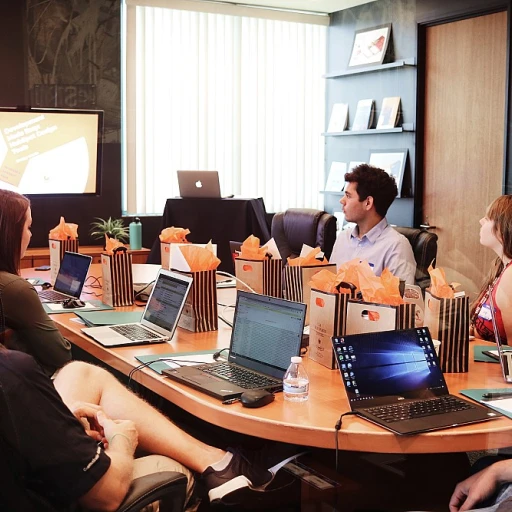
The Rise of Remote Work
Adapting to the New Normal: Remote Work
The shift towards remote work, accelerated by recent global events, is reshaping the traditional work environment, enabling a more flexible and dynamic approach to workforce management. Organizations are increasingly adopting remote work as a viable option, driven by technology advancements and the need for a better work-life balance. Remote work has emerged as a significant trend, allowing employees to work from anywhere, thereby reducing commute times and increasing employee satisfaction. The empowerment of employees through technology has facilitated this transition, making it possible for collaboration and productivity to thrive even when teams are dispersed across various locations. Key to this transformation is the role of technology as an enabler. Cloud-based tools, real-time communication platforms, and data-driven decision-making processes have allowed organizations to maintain, if not enhance, productivity levels. These innovations support workforce enablement by providing employees access to necessary resources and development opportunities needed to perform their roles effectively. Furthermore, remote work caters to varied needs, promoting inclusion by providing flexible options for those in the frontline workforce, caregivers, or individuals with disabilities. By enriching employee engagement and satisfaction, remote work models are laying the groundwork for a diverse and inclusive workplace that values each employee's contributions. To sustain this shift, there is a growing emphasis on continuous learning and training development. Organizations are investing in training programs to equip employees with skills necessary for remote work success. This is pivotal for long-term employee enablement and growth, ensuring that they remain competitive and efficient in a rapidly evolving digital landscape. In supporting your workforce, it’s crucial to focus on customer service and satisfaction, aligned with enabling employees to drive better results. Maximizing the value of tech skills courses can be a stepping stone for businesses aiming to fully embrace the potential of remote work. As we venture further into this era, tailoring employee engagement strategies and fostering positive work cultures will be key components in navigating the future of work successfully.Technology as a Catalyst
Unleashing Potential through Technological Advancements
The modern work environment is undergoing a seismic shift as organizations embrace technology to enhance productivity and engagement. This shift is driven by digital transformation, where technology acts as a catalyst for change, streamlining processes and enabling organizations to thrive in a competitive landscape.
In this era of rapid technological advancement, workforce enablement takes center stage. Employees are not only provided with the necessary tools and resources but are also empowered through continuous learning and personalized learning platforms. These platforms facilitate training development by offering tailored development opportunities that align with individual skills and career goals. The result is a workforce that is agile, knowledgeable, and ready to adapt to new challenges.
Data-driven decision making is another key component of this transformation. With access to real-time data, organizations can assess employee engagement levels, monitor productivity, and support employee satisfaction initiatives. By leveraging data, companies can make informed choices that enhance customer satisfaction and service delivery.
Moreover, technology paves the way for better employee enablement by providing access to resources necessary for performing tasks effectively. It places employees at the forefront, making them feel valued and integral to the organization’s success. This, in turn, drives employee satisfaction, fostering a culture of inclusivity and respect.
As organizations continue to navigate the complexities of digital transformation, the focus remains on enabling employees through advanced technological tools. These tools not only boost employee engagement but also empower the frontline workforce to deliver superior patient care, customer service, and achieve long-term organizational goals.
Skills for the Future
Equipping Employees for the Future
The future of work demands a dynamic approach to skill development, ensuring employees are equipped to face the demands of a rapidly changing landscape. Continuous learning and adaptable skill sets are key to enabling employees to thrive in this evolving environment. Organizations are focusing on employee enablement through a proactive approach to training development, helping their workforce access resources and development opportunities. Technology plays a pivotal role in facilitating real-time skill acquisition for both the frontline workforce and those in more traditional roles. The introduction of digital tools into the work environment allows employees to engage with learning platforms that foster development in an efficient and accessible manner. This emphasis on technology-driven learning is not only heightening employee engagement but also enhancing overall productivity and employee satisfaction. Data-driven methodologies help organizations tailor their workforce enablement strategies. By leveraging data, companies can pinpoint where training is needed most, ensuring employees feel supported in areas critical to their roles. Such targeted approaches to decision making are proving essential for empowering employees in all sectors, whether it's enhancing patient care, boosting customer service, or optimizing organizational productivity. Moreover, the integration of personalized learning tools fosters a culture of continuous learning within organizations, promoting long-term growth and ensuring employees remain agile and capable of meeting customer satisfaction goals. For further insights into how digital transformations impact workforce developments, check out this comprehensive analysis on the role in healthcare staffing here.Diversity and Inclusion
Fostering a Diverse and Inclusive Work Environment
In the evolving landscape of work, diversity and inclusion are no longer just buzzwords; they are essential components of a thriving organization. As companies embrace digital transformation, the need to foster a diverse workforce becomes even more critical. This shift not only enhances employee satisfaction but also boosts productivity and innovation.
Organizations are recognizing the importance of creating an environment where all employees feel valued and empowered. This involves implementing workforce enablement strategies that promote employee engagement and support continuous learning. By providing access to resources and development opportunities, companies can ensure that every employee, from the frontline workforce to senior management, is equipped to contribute effectively.
Data-driven decision making plays a crucial role in advancing diversity and inclusion. By leveraging technology and data, organizations can identify gaps and implement targeted training development programs. These initiatives not only enhance employee enablement but also improve customer satisfaction by ensuring that diverse perspectives are considered in service delivery.
Moreover, fostering an inclusive culture requires a commitment to long-term change. Organizations must prioritize employee well-being and mental health, as discussed earlier, to create a supportive work environment. This holistic approach to diversity and inclusion not only enhances employee satisfaction but also drives overall organizational success.













